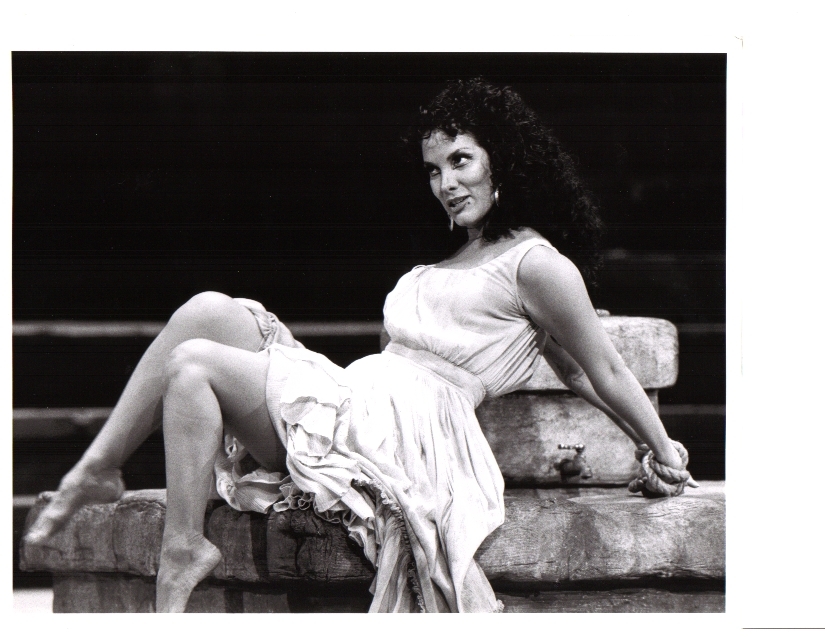As published in Classical Singer Magazine, December 2008
So here we are, back at the question I asked in my first article, “After singing, what else is there?” A friend and colleague told me that all she could do in this life was sing lead roles or teach singing. That may be true, and indeed she is teaching very successfully, but I suspect all of us have untapped means of expression we are afraid to try, until we’re ready.
The Face of Opera Has Changed
A colleague’s manager said to him, “[There are] too many young and very cheap singers, arriving on the market every day, and less and less work. I don’t want to depress you, but I am not at all optimistic for your future in the business.” Like it or not, things change. Let’s be real—opera has changed. Now, not only do you have to sound like the character, you also have to be believable enough to bear the scrutiny of the camera. Think about it, your image is going to be blown up on a screen in a movie theater! We would like to say that doesn’t change the art form, but it does. Opera needed to evolve. This evolution is not necessarily healthy for the purely vocal aspects of opera, but it ensures that more people are exposed to our magical universe, where an Olympic level of singing rules, where the scenery and lighting evoke new worlds, and where quality acting transports us into another realm in the same way as a fine movie, but aflame with the intensity of live performance.
We need to be realistic about whether we fit into this evolving art form. Many may not be able to give as much innuendo and fun and sexiness to Carmen’s first line, “When will I love one of you? I don’t know,” as I have—but do you want to see a 50-year-old face singing a 20-year-old character? I don’t.
We are in an era obsessed with age, beauty, and fame. Is that fair? Probably not, but it is reality. And maybe it is fair. Perhaps it’s time we step aside and let younger singers have their moment. Perhaps it’s time for us to explore other pathways.
Let me quote one of our readers, “I would like to think that I would be gracious and modest enough to realize when my 15 minutes in the spotlight are over, when a newer, fresher singer has evolved into someone who is more qualified . . . and more fit for the part than I am. I would like to think that I will be so thankful for the time I’ve had on stage and the directors, musicians, and teachers who have influenced me that I will be happy with what I have accomplished and be able to step down and take my position as a leader in a smaller capacity, such as a voice teacher.”
Another reader when asked if age makes a difference in a singer’s vocal ability explained it this way: “Age gives wisdom and depth to performance that can’t be taught. I’ve heard performances by voices that were, to put it nicely, past their prime. . . . In those instances, the enjoyment was not simply the beauty of the voice, but the profundity of the human experience that translated itself in[to] a mature performance.”
How true.
Exploring Your Options
I heard a retired Italian soprano at a masterclass four years ago float a perfectly beautiful high C, much to the amazement of everyone in the room. It was truly astounding. Her technique was beautifully intact, and she was able to indicate, and show, how she produced a sound like that. That technical knowledge was still in place, but she was over 70 years old, and the support of that sound was simply not there.
Mind you, this was a very wise and elegant singer who had no illusions about running out that evening and singing Violetta. She was a singer who was valued and respected for her teaching and for the career she had, as well as a very supportive teacher to her students. She felt no jealousy. Now it was time for her to share, and she did so graciously and generously.
I was moved and touched by how many of you have been inspired by your teachers. What a privilege and responsibility it is to teach, but we can’t all be, nor want to be, teachers. What other pathways are there to travel that will bring you joy?
One way to explore new avenues is to uncover your true values, values that are at the very core of who you are. Let me give you an example. How far is remodeling homes and managing a construction company from being an opera singer? It requires a leap, a huge one—and I didn’t “know nothin’ ‘bout birthin’ babies.” But believe it or not, there is a connection. I realized that beauty and making things more beautiful is a core value in my life.
There it is—the connection.
I have great organizational skills; I love to learn new things. My partner is a skilled carpenter and remodeler. He liked the idea of his own business, so we were off and running. I learned about drywall, about cement backer board, about the difference between laying marble and ceramic tile. I learned about designing an estimate—and I learned about coping with interminable building permits.
Remodeling our own homes was even more rewarding. No, it is not fun to live in a home while you’re remodeling, but the results were stunning, and they inspired me to take real-estate investment courses.
I knew absolutely nothing about construction when I started. I was scared and out of my league. Sound familiar? I was scared and out of my league when I came to New York City to sing. I was a big fish in Palm Beach and Miami. I was a minnow in Manhattan, the Mecca of opera. Try something you have a feeling about—no, not in your brain, in your gut, your gut feeling. When you try your first new venture use the same guts you had to have to sing your first Pamina. Harness your love, your joy, your trust.
Yes, you may fail. Thomas Edison failed a thousand times before he developed a useful light bulb. Newman’s Own, Inc., founded on a lark by Paul Newman and his buddy A.E. Hotchner in 1982, is now a leading food company, and the late Paul Newman and the Newman’s Own Foundation have given more than $250 million to thousands of charities worldwide. Anything is possible.
‘L’elisir d’amore’
Does fulfilling contracts for satisfied clients and closing the spreadsheet with a zero balance give me as much excitement as my Amneris uttering the last word at the end of Aida to thunderous applause? No. It’s different, and I think this is the very reason it is so hard for us singers to give up the song. The feedback you get for laying in perfect crown molding may only garner a positive comment and perhaps a recommendation—but the intensely fulfilling feedback we get as performers gets us hooked. That kind of intoxicating acceptance is as heady and addicting as any of the most powerful drugs on the black market.
Marilyn Pratt expressed it perfectly in our survey. “Singing is a socially acceptable venue for expressing extreme emotion.” Where else could you possibly earn an award for expressing enraged depravity, and get paid for it? Where else can you howl like a banshee in front of hundreds of people because your love has left you, and be applauded for it? Yes, it is true that loving your job is a wonderful thing, but if your work becomes a replacement for your life, you’re venturing into very dangerous waters, indeed.
A valuable compass on these waters is a fun and enjoyable tool called the Tru-Values Program (go to www.thefreedomcoach.com and look under “Gifts & Resources”). Knowing which values drive you is a first step toward self-knowledge and key to uncovering a new means of self-expression. You can experience many levels of love for your work. You may find a job that is intellectually stimulating, or one that’s physically difficult but gets you into shape. Your job may simply be a means to an end, a financial benefit so you can have outside interests that fulfill your spirit.
With all my heart I say experiment, experiment, experiment. Letting go of old definitions of ourselves isn’t easy. The unlearning is very difficult indeed. We mustn’t define ourselves narrowly. We have so many ways to fill our lives with music. Don’t stay stuck in the mourning. Cry your tears, but walk out into a new day and a new definition of yourself.
Next month we’ll discuss “a return to love,” returning full circle to the joy of singing but with a very different intent and a surprisingly different outcome. Please continue to share your thoughts, and I am happy to answer your questions.




